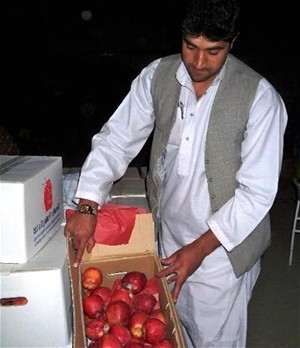Home » Reports & Data » Progress » Transforming Lives » Increasing Profits by Decreasing Produce Loss

Newly introduced cartons hold five to six kg of produce, resulting in less pressure in the cartons and a reduced loss of produce during shipping.
USAID/ASAP
Improved shipping cartons and packaging methods bring more Afghan produce to international markets.
23 MAY 2009 | KABUL, AFGHANISTAN
Afghanistan grows an abundance of fresh, delicious fruits and vegetables. Some crops, like Afghan pomegranates, are considered the best in the world. Consequently, export opportunities are increasing, with companies selling their harvests to regional countries like the UAE, India, and Turkmenistan.
However, many companies face difficulties during the packing and shipping process, resulting in the spoilage of produce and loss of income. USAID provides improved packing materials and training in produce sorting and packing, helping Afghan companies to export their produce with minimal product loss.
The Osmanian Trading Company Ltd. has been exporting Afghan apples, potatoes, onions and pomegranates to Turkmenistan for the past three years. Last year, the company exported 66 metric tons (MT) of apples and pomegranates. At that time, each carton was filled with 20 to 22 kg of produce, which meant that too much fruit was packed in each shipping container. The tight fit resulted in a loss of produce valued at $37,000 by the time the shipment reached its destination.
USAID provided Osmanian with 2,500 cartons for apples and 9,000 cartons for pomegranates in August 2008. USAID also trained workers of the fruit-packing facilities to better sort produce and use improved packaging materials.
By using the new cartons and the newly introduced sorting and packaging techniques, the Osmanian Trading Company was able to ship 50,000 kg of pomegranates and 50,000 kg of apples at a combined market value of $95,000. More importantly, Osmanian delivered the fruit with minimal product loss, increasing profits and building a reputation as a reliable shipper with its Turkmen trading partners.
“Since receiving the cartons and training, we decreased our produce losses by 80 percent,” the company’s deputy director Osmani Nargyalai explained.
Seeing the fruits of its collaboration with USAID, Osmanian is eager to expand even further and is exploring the possibility of exporting Afghan onions, apricots and other fresh fruits to Turkmenistan. “USAID’s assistance came at the end of the pomegranate season with great results. Next season we can benefit for the entire season. We expect our exports to grow significantly,” said Nargyalai.







Comment
Make a general inquiry or suggest an improvement.